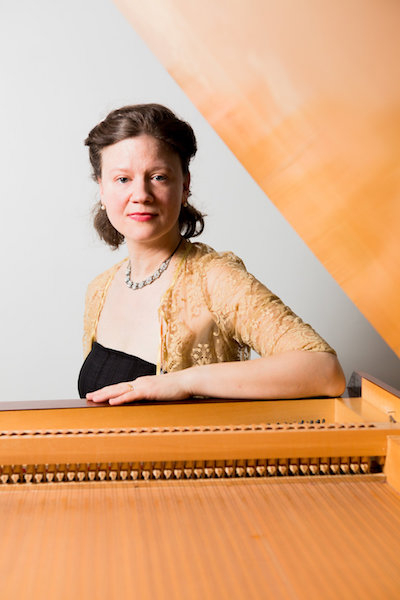by Daniel Hathaway

On Sunday afternoon’s program in Herr Chapel at Plymouth Church in Shaker Heights, Mozart himself was represented only by one of his earlier works, in a version made after his death. The so-called Gran Partita, or Serenade in B-flat, K. 361/370a, several of whose movements began and ended the concert, was conceived as an outdoor or banqueting hall work for a 12-piece wind band plus double bass. Les Délices audiences heard it in an arrangement for five instruments made by Christian Friedrich Gottlieb Schwencke around 1805. Renamed as a Grand Quintetto, Schwencke’s reworking adds a veneer of refinement to the piece in transforming it into a chamber work for oboe quartet and piano.
Oboist Debra Nagy, violinist Julie Andrijeski, violist Allison Monroe, and cellist Jaap ter Linden joined Berry in the first movement at the beginning of the program, then brought the afternoon to a conclusion with the Adagio, Tema con variazioni, and Finale. Though audience members who know the original may have been taken aback at the appropriation (and taming) of a favorite work, Les Délices gave the movements sensitive and nuanced performances.
The rest of the playlist featured works by two Italians and a German whose music was popular in 1778. The title of Luigi Boccherini’s Sonata di cembalo e violino obbligato, Op. 5, No. 1 gives a clue to the prominence of the keyboard instrument over its bowed colleague — although the revised version of the piece comes from a collection that translates as “Six sonatas for forte-piano, with accompaniment of a violin.” We’ve obviously reached the moment when the fortepiano was edging the harpsichord out. Berry played with expressive charm, and Andrijeski made the most out of her secondary role.
Giuseppe Maria Cambini’s Trio concertans, Op. 3, No. 4 gave Berry a break as Andrijeski, Monroe, and ter Linden brilliantly explored its lightweight lines and textures à trois.
The most substantial work in the torso of the program, Johann Schobert’s Sonata pour le clavecin (en quatuor), Op. 14, No. 1, showed its composer to be a fluent pianist who knew his way around the keyboard. Its opening movement provided a nice shift in timbre, all the strings playing muted. The middle movement, Andante Polonoise, was spiky with accents, and the concluding Menuetto — Trio found Berry responding to lyrical gestures in the strings with elaborate filigree, and Schobert indulging in some dark chromaticism.
Between the pieces, the five musicians took turns reading salient passages from Mozart’s letters to his father, mostly complaining about his lodgings, the filthiness of the city, the difficulty he had getting around to network, and his treatment by the Parisians (notably by such composers as Cambini, who Mozart believed had torpedoed a promised performance of his Sinfonia Concertante). Some of his reports got a chuckle — as when he celebrated a rare musical victory by going for ice cream.
The large audience responded to the splendid playing during this well-planned, 90-minute travelogue with a long ovation. Many moved on to Edwins in Shaker Square afterwards to celebrate Les Délices’s tenth anniversary with a benefit evening. Joyeux dixième anniversaire!
Published on ClevelandClassical.com October 10, 2018.
Click here for a printable copy of this article


